Before and After Sappho: Logos
Ruthann Robson
Of course, there is Helen.
Helen of Troy. Helen of Sparta. Helen of the golden-hair and honey-voice. Helen of the swan-neck, the white arms, the silver-sandals. Helen of the terrible beauty. Helen of the thousand ships. Helen of the rosy dawn of history, six hundred years, more or less, before Sappho.
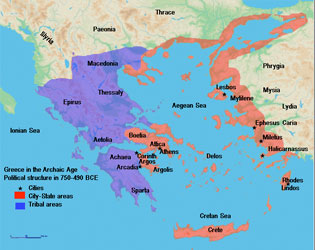 That Helen.
That Helen.
Some say Helen is a myth.
Sappho says Helen was a mortal woman.
I say every mortal woman is a myth.
Our matrix is memory, warring memories.
Our logos is to count, to speak, to tell, to say what cannot be said.
Helen, before and after a war, was a queen.
I remember sitting in the backseat of my parents' car, an old boat even then, during a different war, two thousand five hundred fifty years, more or less, after Sappho.
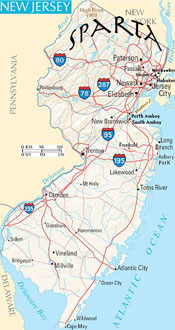 We sailed across the plains of New Jersey. Although I am golden-haired and white-armed, I already know I am not a princess, know I will never be a queen. I see a sign, I decipher its meaning: the next exit is Sparta. I sing Sparta as if the "t" were a devotion, a libation to Aphrodite or Artemis, the most important letter in all of history. I sing Sparta until I am told to shut up, and then I hum it under my breath.
We sailed across the plains of New Jersey. Although I am golden-haired and white-armed, I already know I am not a princess, know I will never be a queen. I see a sign, I decipher its meaning: the next exit is Sparta. I sing Sparta as if the "t" were a devotion, a libation to Aphrodite or Artemis, the most important letter in all of history. I sing Sparta until I am told to shut up, and then I hum it under my breath.
I am going there - - - Sparta - - - to Girl Scout camp. We campers had our instructions, sent to us beforehand, folded into an envelope. We were not to pack candy, cosmetics, or books. We were to bring a flashlight. I have hidden a few books in my sleeping bag; they bulge and mar what should be the smooth and rounded accomplishment of a beautiful bedroll. I have forgotten the flashlight.
One of my tent-mates, Helen, unrolls her sleeping bag to reveal a bottle of eyeliner. She has brought grape gumballs, only a few of which are broken. She has a mirror.
She has also forgotten her flashlight.
This Helen is afraid of the dark. She tells me it scares her to death.
In the evening, we are encircled with other girls. The moon's rosy fingers light up the long twilight and we gather around something that looks like a funeral pyre. "This is our tradition," someone says. "All Girl Scouts sing songs around a campfire and the counselors tell stories they know by heart."

Helen's eyes gleam, rimmed with kohl. Her lips are purpled, from the candy. When we have to walk back to our tent in the blackness, I take her hand, safe in the dark, and guide her through the chervil-scented woods.
"You are my hero," this Helen says. Her words are like water. I am thirsty. I forget my books.
H.D. - - - writer of books - - - was not named Helen, but Hilda, when she was born, almost two-thousand-five-hundred years after Sappho, in the little town of Bethlehem, oh, not terribly far from Sparta, New Jersey. She was a mortal woman, dying as she wrote her epic questions:
There was a Helen before there was a War,
but who remembers her?
and
But there was a Helen before there was a war
did Paris remember her?
and
Who, after all, is Paris?
Recall the myth: Helen, Princess of Sparta, was the daughter of her mother, Leda (yes, that Leda). Her father was the god Zeus as a swan, although in an alternative version, her father is Leda's husband, the mortal King Tyndareus. In all versions, Helen is reputed to be the most beautiful woman in the world and has many suitors. Before she (or in another alternative version, her mortal father) chose one, there was an agreement (suggested by Odysseus, who wanted not Helen, but Penelope) that all the suitors would swear to defend the choice of a husband.
In all versions, the husband chosen was the red-haired Menelaus (brother of Agamemnon).
All was well, more or less, and Helen had a daughter, named Hermione. But then Paris (sometimes called Alexander) of Troy (sometimes called Ilium) came to Sparta, dragging bits of history and myth and a prophecy or two.
Helen and Paris left Sparta. And then there was war, the Trojan War.
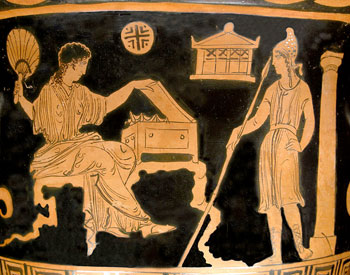
There are warring versions:
Some say Helen was abducted by Paris.
Sappho says Helen followed the goddess Aphrodite.
Some say Helen and Paris went to Troy
H.D. says Helen went to Egypt.
Homer says Helen went back to Sparta with Menelaus.
Some say Helen went to Olympus and became immortal.
Nicole Brossard, writing almost twenty six hundred years after Sappho, says: Une lesbienne qui ne reinvente pas le mot -- - pas le monde - - - est une lesbienne en voie de disparition.
Reinvente: Of course, Paris is a woman.
Let's say: Helen, of the moderate beauty, the duck feet and hennaed hair, the tanned-in-summer arms and husky voice, was vaguely unsatisfied with Menelaus. Sure, she had chosen him, but the lot had not been very attractive.
When Paris showed up, Helen understood those hazy feelings she'd been having since she was a girl afraid of the dark in Sparta. She understood that she would have to leave her daughter Hermione behind; she would never win a custody battle, even then.
But where to go? Troy was just another windy city, like Chicago, really, although the streets were reputed to be paved with gold. Egypt? She didn't know the language.
Lesbos was the obvious choice. Not very far from Troy. And an island.
It does seem a little odd, at first, to think of Paris as a mortal woman.
But certain mythical facts bear remembering. Let us engage in a bit of rhetoric, a dialogue of logos. Let us inquire together.
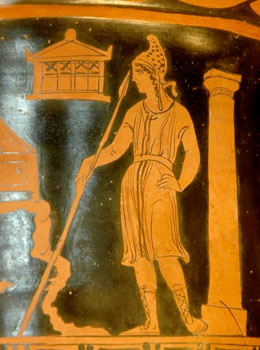 Paris was exposed on the mountain as an infant, is this not true?
Paris was exposed on the mountain as an infant, is this not true?
Yes, this is as true as any myth is true.
And typically, girls, not boys, were exposed? Were they not?
Yes. Female infanticide was not beautiful, but common.
And then there is Homer, writing (or perhaps not writing, if one believes the myths about Homer as an illiterate bard) more than one hundred years before Sappho. Homer incessantly implies Paris is effete or effeminate.
Once again, perfectly right. Paris of the gorgeously woven clothes. Also he is rather young. Like a schoolboy.
And Paris is deft with a bow and arrow, like an Amazon, rather than accomplished with the manly short spear.
A short spear requires upper-body strength.
But might there be other reasons?
Such as?
Some say Paris is Persian, Ottoman, Oriental; Troy being part of Asia rather than Europe. Men are different there. Think of their wiles, their wars.
Some say Paris is simply smitten with Helen; not simply an adulterer, but pussy-whipped. You may have heard the term?
I say: every mortal woman is a myth, even Paris, the Paris of Homer.
Some say Homer is a woman. A homeless, illiterate, old woman. And no beauty, to be sure.
Maybe not the Homer of the Iliad, a story of war, a story of the killer Achilles, a hero, a story of few women. But the Homer of The Odyssey, a tale of travel. Although the Odyssey also has a hero, named, conveniently enough, Odysseus. This Odysseus makes his way back from Troy through storms and sirens and Cyclops and shipwrecks to his faithful weaving wife, Penelope. Now, this is the truly amazing part: when they share their stories - - - so, what have you been doing these past ten years? - - - Penelope tells her story first.
Of course, no male author would have arranged a story thusly. Allowing a woman to speak before a man? Only a woman would be so perverse. Or so the rhetorical argument goes.
Forget being effeminate, parading around in glorious dresses and drawing a bow like a girl, it's the way one structures a mythic conversation that reveals the secret of gender.
Homer, woman or man, writing or not-writing, at least a century before Sappho and centuries after Helen and her girlfriend Paris, was prolific. Reputedly, there is more than the Iliad and the Odyssey. These lost works have names. There's the Little Iliad and the Cypria, there's the Nostoi (the Returns) and the Epigoni (the Progeny), there's the Batrachomyomachia (the Frog-Mouse War). A career built around the fall of a city and a war. So many epics adrift!
Sappho, writing in her Sapphic stanzas as well as other forms, living on Lesbos when she was not living in exile, reputedly authored nine books of verses. These papyrus, or perhaps parchment, scrolls were housed in the Library of Alexandria, a Palace of Memory in the House of Muses, in Egypt, in the third century, B.C., three hundred years or so after Sappho.
Burnt. As Troy was sacked and set ablaze by the Greeks, so too did the Library of Alexandria succumb to fire. Perhaps this one was set by Julius Caesar. Perhaps the Muslims. Perhaps the Christians. There are a variety of myths from which to choose.
The arson investigators always have their own theories. Two thousand five hundred fifty years after Sappho, as the internet is being invented on the other side of the continent, I almost surrender to a five-alarm fire in my less than palatial apartment, not far from Sparta. The flames like dreams, hot and thick as drugs. My bookshelves a pyre. I cringe on the ramparts, soot on my white arms, smoke in my golden hair. I call out to Aphrodite, Artemis, Athena, as the firemen with their axes invade and then capture me into what they say will be safety.

What do you save, when you can save only one thing? The silver sandals? The Selected Poems of H.D. or a volume of the diaries of Virginia Woolf? A girl scout badge or a cat named Antigone?
I chose to save myself.
Suspicion would be cast on the boys next door. The term hate-crime was not yet current, but the idea had long been understood. Two "girls" living together, seen holding hands on the street, glimpsed through the curtains that billowed in the wind. It is enough to drive schoolboys mad.
The final report would settle on an oil lamp. Despite our protestations that it had never been lit; did not even have a wick, did not have oil. It was a gift. An amphora from a friend who had visited Greece. Maybe Crete. Maybe Cyprus. Maybe Lesbos.
I would be able to salvage some of my books.
I say: immortal; I say: our matrix is reinvention; I say our logos is mythos.
I say I cannot find a woman's bookstore in this city, although it is bigger than Chicago, richer than Troy, more heroic than Sparta. And in the huge agoras of the printed and not-printed word, I say I cannot find a lesbian text.
Before, there were bookshelves and bookshelves that said "Women's Studies," that said "Lesbian," that said "Queer Theory."
After, there is a single shelf that says "Alternative."
After, there are bookshelves and bookshelves that say "Christian Interest."
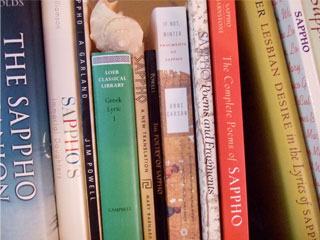 I go to a library, a temple of knowledge.
I go to a library, a temple of knowledge.
I ask for Volume Five of the Collected Works of Sappho.
The librarian gazes at me, assessing my capacity for treachery. She has a panic button under her desk, installed in the days when the major worries were homeless men and middle-school boys, both groups unstable and prone to rages. Now there are also fears of the terrorists, waging a war which relies upon information, as all wars do.
I say: "I'm pretty sure it's volume five." Though I am sure of no such thing. My voice is sing-song, childish.
I say: "I'm looking for the texts about Cassandra."
She says: "That's my name. Cassandra."
She is moderately beautiful and has wind-blown red hair and freckled arms. She wears sandals and speaks calmly.
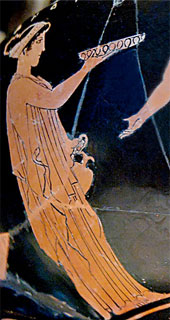 How treacherous, your parents, I want to say, but hold my tongue. To burden you with such a name. To be believed only once, when you reveal Paris, the infant exposed on the mountain, did not die but had returned to claim the royal line. Your sibling! Paris. Called, at times, Alexander, just as you are called, at times, Alexandra. But you are not twins. Though you are both women, a secret you keep.
How treacherous, your parents, I want to say, but hold my tongue. To burden you with such a name. To be believed only once, when you reveal Paris, the infant exposed on the mountain, did not die but had returned to claim the royal line. Your sibling! Paris. Called, at times, Alexander, just as you are called, at times, Alexandra. But you are not twins. Though you are both women, a secret you keep.
And you well understand why Paris passes as a man.
Cassandra, cursed by Apollo when you resisted his advances
(oh, why does the god of Reason always go insane whenever he is rebuffed by a woman?);
Cassandra, locked up by your parents because you tell the truth but are not believed (little wonder you are a little crazy);
Cassandra, raped in the temple during the sacking of Troy;
Cassandra, raped again by Agamemnon and taken as his slave;
Cassandra, murdered by Clytemnestra, Agamemnon's wife, what a terrible unfairness.
That Cassandra.
This Cassandra seems not to know her name is a war.
No one is named Sappho any more. On Lesbos, for centuries after Sappho, every family who had a daughter had a daughter named Sappho. Or so it was said.
Now, it is not a popular name for a daughter.
Now, it is more common to find a dog named Sappho than a daughter.
But Cassandra, Sappho would have no doubt reinvented you, six centuries after the flames blew through Troy.
I have invented one of Sappho's lost nameless fragments:
Cassandra
]weaving?[
eros
beach rubble
shipwrecked on Lesbos
with ]Helen?[
before after
sea . . . death . . . flower . . . star . . . moon . . . .
tongue no longer broken
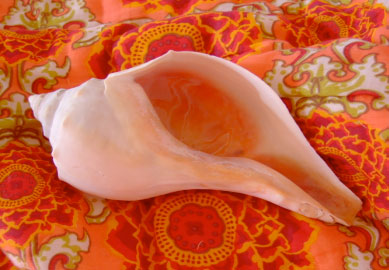
Cassandra and I consult the library computers. Cassandra and I make a list. Cassandra agrees to go to the basement, although it is dark and dusty. If I had a flashlight, a torch, I would give it to her.
Cassandra exits.
Cassandra reenters. She is holding a book entitled Cassandra.
She says: "This one was in storage. Do you want it?"
I say: Eros. I say: shipwrecked on Lesbos. I say: broken moon.
I say: "Sure."
I vaguely remember this book. I remember it from the apogee of women's writing. The days of écriture feminine. The nights of lesbian texts. The reclaiming of myths: Athena, Amazon, Gorgon, Naiad, Medea, Charis, Kalliope, Persephone, Ariadne, Meanad.
Sappho, Sappho, Sappho.
 Christa Wolf, writing two thousand five hundred eighty years, more or less, after Sappho, is the East German author of Cassandra.
Christa Wolf, writing two thousand five hundred eighty years, more or less, after Sappho, is the East German author of Cassandra.
She is not to be confused with Virginia-two-O's-Woolf, the British author, writing two thousand five hundred twenty five years, more or less, after Sappho.
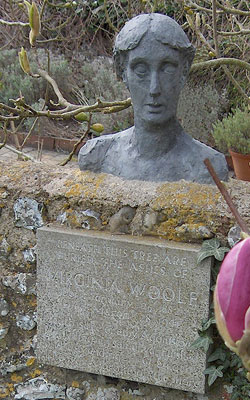 Virginia Woolf writes, "sea, death, flower, star, moon."
Virginia Woolf writes, "sea, death, flower, star, moon."
This is in a footnote.
Virginia Woolf is writing in English about not knowing Greek.
She says, ""translations can offer us but a vague equivalent; their language is necessarily full of echoes and associations."
Christa Wolf writes, "the extraction of a single 'skein' for purposes of narration and study damages the entire fabric, including the 'skein.' "
Christa Wolf is writing in German about writing about Cassandra.
She says it is possible that Cassandra did not know Greek, but had a different mother tongue.
Nicole Brossard is writing in French,
She says, " . . . une lesbienne en voie de disparition."
Disparition echoes. Disappearing? Going extinct? Endangered? Passing? Dying?
It is a French man who writes: "Achilles only exists because of Homer." In the Iliad, Achilles is not killed. Homer saves such a death for the lost books.
It is Christa Wolf who writes: "Who can I tell the Iliad bores me?"
I say: Tell me! Tell me! Even as I know she has already told me. Writing her query in her book, sending it across the distance of nations, through a labyrinth of languages, down the narrow river of years, she has sent me a message.
It would be impolite not to reply.
I say: "Of course the Iliad bores you. Its eros is conquest. Helen appears only a handful of times. And the first time, she does not even speak! And when she does speak, she is apt to describe herself as a dog (or, depending upon the translation, as a bitch, or as a whore). As for Cassandra, she is a bit player without even her accursed gift of prophecy. She is merely a daughter, simply a princess. She is a girl scout."
Christa Wolf does not answer me.
It is exactly as Socrates says:
"Writing is unfortunately like painting; for the creations of the painter have the attitude of life, and yet if you ask them a question they preserve a solemn silence."
Or perhaps this is not exactly what Socrates says.
Socrates, put to death two hundred years or so after Sappho, speaks through Plato, who started writing after Socrates' trial and execution.
When Socrates says writing preserves a solemn silence when asked a question - - - or, in another translation, when Socrates says writing maintains a most majestic silence when questioned - - - Socrates is responding, not to a question, but to Phaedrus.
Before Socrates speaks, Phaedrus says: "Very true."
After Socrates speaks, Phaedrus says: "Once again you are perfectly right."
This is men's dialogue; this is male logos. It must be distinguished from mere rhetoric, simple sophistry, from the works of men such as Gorgias.
Gorgias, the Sophist. Gorgias, who although not immortal reputedly lived to be a hundred, dying two centuries after Sappho, dying two decades after Socrates is put to death. Gorgias, rhetorician and reinventor of paradox. Gorgias, author of a lost work entitled The Non-Existent. Gorgias, author of The Encomium of Helen.
The Encomium of Helen was written not so much to defend Helen, although there is that, but, as Gorgias says, "for his own amusement," and as I say, "for his own ego."
Gorgias argues Helen (unsaid: the harlot, the adulteress, the dog) is blameless, because she was conquered by one of four powers:
the gods (meaning Aphrodite);
physical force (meaning rape and enslavement);
eros (meaning lust);
or logos (saying:
"the power of discourse stands in the same relation to the soul's organization as the pharmacopoeia does to the physiology of bodies"
or in another translation
"the effect of speech upon the condition of the soul is comparable to the power of drugs over the nature of bodies").
When I lived in a women's commune, there was pharmacopoeia and physiology; there were drugs and nature and bodies; there was logos until the rosy fingers of dawn clawed away the moon; there was discourse about the soul and about rape; there was eros.
There was disagreement.
No woman ever said "Very true."
No woman ever said, "You are perfectly right."
We loved each other too much to resort to lies.
We argued until we cried, dark seas stained our faces.
Helen appears in Homer's Odyssey only once. Helen, after the Fall of Troy. Helen, after having sailed home to Sparta. Helen, again Queen. Helen, greeting the sons of Odysseus and Nestor, reminiscing about the sorrows of war, with her now-again-husband. Helen, missing - - - I say; Homer does not say - - - her passionate Paris. Helen, sad Helen, dilutes the wine with the drug Nepenthe.
 Nepenthe, Homer says, is so potent that even if your mother should die right before your eyes, no tears would you shed, no pain would you feel.
Nepenthe, Homer says, is so potent that even if your mother should die right before your eyes, no tears would you shed, no pain would you feel.
Nepenthe, Homer says, is a gift from a woman of Egypt. Although as an opiate, a treasure of the poppy flower, it is more common to Troy, and even to Sparta, than to Egypt.
Socrates, as written by Plato, speaking again to Phaedrus, has something else to say about Egypt.
Socrates says: In Egypt, there was a famous old god, Theuth, whose great discovery was the use of letters. Thamus, a King in Egypt, refuted Theuth's panegyric on the merits of writing as an aid to memory and wisdom.
Socrates says that Thamus says: "If men learn this, it will implant forgetfulness in their souls; they will cease to exercise memory because they rely on what is written, calling things to remembrance no longer from within themselves, but by external marks. What you have discovered is a recipe not for memory, but for reminder."
Writing, it is said, is not wisdom, merely the conceit of wisdom.
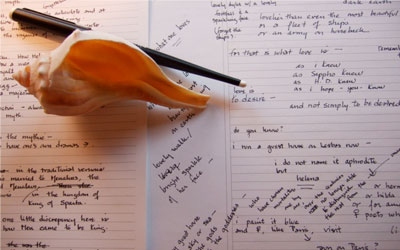
Some said the same about the printing press.
Many say the same about the internet, email, text messaging, blogging.
Information without knowledge is effete.
Helen finds me through the ethernet, through the wi-fi, through my I-phone. Helen of the girl scout camp, of the kohl-eyes and grape-candy lips. Helen of the fear of the dark.
That Helen.
She has become a computer programmer. She'd like to "reconnect." She has a profile on myspace.com and one on facebook. We can network.
Cassandra, the librarian, emails me: One of the books you requested has arrived and is available for pick-up.
Can it be Sappho's fifth volume?
I imagine it found, having been in storage all these centuries, buried in the basement of some island library, a papyrus, a parchment, a potsherd, a codex! But will I be able to read it?
Virginia Woolf says: It is vain and foolish to talk of knowing Greek.
When we read a fragment of Sappho, Virginia Woolf asks, "are we not reading wrongly? losing our sharp sight in the haze of associations? - reading into Greek poetry not what they have but what we lack?"
We lack the other eight volumes of Sappho. The book Cassandra brings me is not Sappho's Helen on Lesbos, but H.D.'s Helen in Egypt.
H.D. must have read Plato. Socrates, speaking to Phaedrus, quotes a famous refutation, a palinode: "False, false the tale" that Helen ever went to Troy. Although it seems H.D. believed another falsehood, the lie of Egypt.
"H.D." as it appears on the cover of the book is covered over by a label:

I say: "I thought librarians had a responsibility toward the treasures in their care."
Cassandra shrugs.
Hilda Dolittle, who reinvented herself from the girlchild exposed in the coal-hills of that little town of Bethlehem - - - or who allowed herself to be reinvented - - - into H.D., Imagiste.
H.D., who then reinvented herself into Helen. Helen of Troy. Helen of Sparta. Helen of the terrible beauty, the cruel mortality.
H.D. says: "and that my mother's name was Helen had no doubt something to do with it."
H.D. of the unsatisfactory dalliances with minor writers (Pound, Lawrence) and major fathers (Freud), whom she reinvented as Greek heroes (Odysseus, Achilles) (Theseus).
H.D. of the woman lover Bryher, together longer than the Trojan War, through World Wars One and Two. Bryher, who reinvented herself from the daughter of a fabulously wealthy Brit into a writer with the name of an island off the coast of England.
Why doesn't Hilda/Helen reinvent the woman Bryher as the woman Paris?
Why doesn't The Iliad bore them all?
It probably bored old Homer. Homer, the writer or not writer, going on and on. Discoursing on the genealogies of men. Cataloguing ships. Retelling old tales: Have you heard the one about the folded tablet hiding markings (a letter with letters)? Hah! Kill the bearer of this message.
Sappho has a riddle: What is voiceless but speaks to those far away, although those nearest may not be able to hear?
A letter!
Cassandra wrote no letters.
Helen wrote no letters.
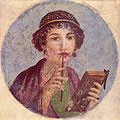
There was no writing. Only pottery. Only weaving. Only logos as lyric, as song, as accounting.
Nicole Brossard's The Aerial Letter is both epistle and alphabet. It is a text that insinuates "we are always like water and mirror, fire and matrix, like that which conquers even the principle of conquest." I am an archeologist excavating in my basement, searching for lost and plundered treasures, wielding my flashlight like a short sword.
Actually I am looking for a booklet I must have put in storage; I cannot find it on the bookshelves of what I like to call, despite the pretensiousness, my library.
I am seeking a brochure entitled "Before and After Unicode: Working with Polytonic Greek." As I recall, it demonstrates computer techniques for writing ancient Greek in English documents.
I want to say this:
![]()
It is a fragment from Sappho and is translated as
if you are squeamish
don't prod the
beach rubble
or
do not move stones
or
Stir not the pebbles
or
]My advice to you is:[
don't disturb
the jetsam
]on the beach[
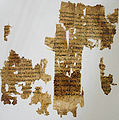
I do not find the brochure.
What I do find is a letter I never meant to keep, tucked in a small thin text, another translation of Sappho. The slender volume is inappropriate for the pressing of something precious, even a flower, never mind a missive. Although it is more of a note, really, a brief farewell, a be-back-soon. I do remember the writer. As golden-haired and swan-necked as Helen, as stubborn as Antigone, as finicky as Paris, as confident as Cassandra, at times as brave as Penthesilea, and always as devious as Penelope.
Ah, but she was not my Helen, or my Paris; she was not my Cassandra or my Penelope; not my Antigone; not my Penthesilea. And she was certainly not my Sappho.
And certainly, I was not her Sappho.
She was not a woman who could abide a muse.
Plato, writing two centuries after Sappho, says:
"Some say the muses are nine - how careless - behold, Sappho of Lesbos is the tenth."
Or reputedly says. This is not in the Collected Dialogues of Plato.
Everyone says the Muses are women.
Some say the Muses, the Mneiae, are also called the Remembrances.
Most cannot remember their names.
Few can remember their responsibilities: epic poetry, history, erotic poetry, lyric poetry, tragedy, song, comedy, and astronomy.
I say this: Where is the muse of weaving? Where is the muse of pottery? Of painting? Where is the muse of kohl? Where is the muse of lost letters? Of the internet? Of not burning books? Of not warring?
Where is the muse who remembers this?:
It was Paris - - - that girl! - - - who killed Achilles. When the brave and manly had died trying. And when the brave and Amazonian Penthesilea had died trying.
Where is the muse of heroes who will reinvent the rape of war?:
Reinvent Achilles falling in love - - - (meaning: what?) - - - with Penthesilea's corpse on the battlefield outside the then-still-standing walls of Troy.
Where is the muse of palinodes who will revise the lies?
Revise the lie of Helen as a dog, a bitch, a whore, repeated by Homer and his translators.
Revise the lies of Helen as drugged by logos or love, advanced by Gorgias and Sappho; or Helen innocent in Egypt; or Helen mated with Achilles in immortality.
Revise the dogged lies of Helen, casually echoed by Virginia Woolf in one of her many letters: "while I sit at home with my bitch, Grishka, who is on heat, and all the dogs of the village throw their noses up and whine and snuff and come prowling about the house after dark till it seems like a rustic and impoverished version of Helen of Troy."
Where is the muse of the matrix who will reply?
Reply to Christa Wolf when she asks, "Who was Cassandra before anyone wrote about her?"
Reply to H.D. when she asks, "Who has been here before?"
We are here. We are our own muses.
H.D. says Helen says: "there is no before and no after."
Christa Wolf says: "the entire past existence of women has been unrealistic."
Virginia Woolf says: "sick of the vagueness, of the confusion, of the Christianity and its consolations, of our own age."
We are those who remember:
Homer says Helen says: "so for generations still unborn, we will live in song."
Christa Wolf says Cassandra says: "But more than anything else we talked about who would come after us…. We racked our brains trying to send them a message, but did not know any script to write in."
Sappho says Sappho says: "I say that in some future time someone will remember us."
Here we are, the generation now born, the women who have come after, the ones in some future time with our words once written down that are "tumbled about anywhere among those who may or may not understand them" (as Plato says Socrates says).
Here we are.
Or not.
As Nicole Brossard says: "The lesbian creates space and time."
We do not need their Homer. Their wars. Their rhetoric, dialogues. Their "very true, Socrates." Their translations. Their fires.
We do not need our Helen or our Cassandra.
We do not need our Paris, lovely girl though she is.
We do not need our Pentheselia, who exists although she is not mentioned in Homer.
We do not need Virginia or Christa, with their Christian names, or Hilda, with her precious initials. We do not need their libraries, their girl scout camps, their bookstore shelves marked "Alternative."
We do not even need Sappho.
We are those who reinvent.
We are those who reinvent logos, mythos, eros.
We are.
Notes and References

This essay, "Logos", is the first in a three-part series Before and After Sappho. The second essay,"Eudaemonia", focuses on Artemis and is forthcoming in Law and Literature; the third essay, "Demokratia", focuses on Antigone and is forthcoming in Stetson Law Review.
For background on Helen, I am indebted to the popular scholarly book by Bettany Hughes, Helen of Troy (New York: Knopf 2005) and the novel by Margaret George, Helen of Troy (New York: Penguin Books, 2007). Specific information on the myths (including alternative myths) of Helen, as well as on Cassandra, Penthesilea, and others is derived from entries in Robert E. Bell, Women in Classical Mythology (New York, Oxford: Oxford University Press 1991) and Michael Grant and John Hazel, Who's Who in Classical Mythology, (New York, Oxford: Oxford University Press 1973, 1993). An excellent feminist treatment of Helen in Homer's Iliad, with specific discussion of "dog," is Hanna M. Roisman, "Helen in the Iliad; Causa Belli and Victim of War: From Silent Weaver to Public Speaker," American Journal of Philology 127 (2006) 1-36.
I used the "new" Robert Flagles translations of Homer's the Iliad and the Odyssey, with Introduction and Notes by Bernard Knox (Penguin Books, 1996). The reference to Helen's use of the Egyptian drug (nepenthe) so potent one would not be moved by one's parents' deaths is from the Odyssey, Book 4, lines 240-260; the statement of Helen that "even for generations still unborn we will live in song," is from the Iliad, Book 6, lines 425-26. I found helpful Alberto Manguel, Homer's The Iliad and the Odyssey: A Biography (New York: Atlantic Monthly Press, 2007). Manguel briefly discusses (at 183-187) the argument that Homer (as the author of the Odyssey) was a woman as was advanced by Samuel Butler in The Authoress of the Odyssey (1897). Manguel also quotes (at 68) François-René de Chateaubriand, Les Natchez (1826), for the observation that "Achilles only exists because of Homer."
The famous "defense" of Helen by Gorgias, "Encomium of Helen," is available at http://www.bemidjistate.edu/academics/departments/english/Donovan/helen.html (trans. Brian Donovan).
None of these sources, or any other source I have read, imagines Paris might have been a woman or Helen and Paris lesbians.
My understanding and knowledge of Sappho's work relies upon a variety of sources, but my first choice of reference is always the excellent Jane McIntosh Snyder, Lesbian Desire in the Lyrics of Sappho (New York: Columbia University Press 1997). The translations and "testimonia" about Sappho are generally derived from David A. Campbell, ed., Greek Lyric: Sappho and Alcaeus. trans. Vol. 142 (Cambridge & London: Harvard University Press, 1982, 2002), the Loeb Classical Library edition, unless otherwise noted. Sappho's fragment that most extensively treats Helen (and mentions her as a mortal woman) is fragment 16, at page 67 of the Loeb edition. The "testominia" regarding Sappho's riddle of the letter is at Testimonia 25, n.2, at page 27; Plato's reference to Sappho as the "tenth muse" is at Testimonia 60 at page 49 quoting Palatine Anthology: Plato, On the Muses. Sappho's fragment 147 concerns being remembered in the future; I have modified the Leob edition translation. The observation that Sappho is no longer a popular name is from Margaret Reynolds, The Sappho Companion 1 (New York: Palgrave, 2000).
The translations of ![]() are from (in order of appearance): Mary Barnard, Sappho: A New Translation (fragment 84; unnumbered pages) (Berkeley, CA: University of California Press, 1958); Anne Carson, If Not, Winter: Fragments of Sappho 293 (frag 145) (New York: Random House, 2002); The Poems of Sappho, available at: http://www.sacred-texts.com/cla/sappho/ (trans. Edwin Marion Cox, 1925; updated J.B. Hare, 2000) at Part 2, number 108; Josephine Balmer, Sappho: Poems and Fragments (fragment 9; pages unnumbered) (New York: Carol Publishing Group, 1993). The Loeb Classical Library Edition, translates it as "don't move gravel." (fragment 145, at 159).
are from (in order of appearance): Mary Barnard, Sappho: A New Translation (fragment 84; unnumbered pages) (Berkeley, CA: University of California Press, 1958); Anne Carson, If Not, Winter: Fragments of Sappho 293 (frag 145) (New York: Random House, 2002); The Poems of Sappho, available at: http://www.sacred-texts.com/cla/sappho/ (trans. Edwin Marion Cox, 1925; updated J.B. Hare, 2000) at Part 2, number 108; Josephine Balmer, Sappho: Poems and Fragments (fragment 9; pages unnumbered) (New York: Carol Publishing Group, 1993). The Loeb Classical Library Edition, translates it as "don't move gravel." (fragment 145, at 159).
For Plato's dialogue "Phaedrus," I have used the version in Plato: The Collected Dialogues (ed. Edith Hamilton & Huntington Cairns) (Princeton: Princeton University Press, 1961). The material discussed is from lines 275e, and lines 274 c - e.
For information generally about H.D., I have relied upon Janice S. Robinson, H.D.: The Life and Work of an American Poet (Boston: Houghton Mifflin Company, 1982). The quotes from H.D.'s work asking "epic questions" are from (in order of appearance): H.D. "Winter Love" in H.D., Hermetic Definition 91, 110 (New York: New Directions 1972); Ibid. at 114; H.D., Helen in Egypt 298 (New York: New Directions 1961). H.D.'s statement that "her mother's name was Helen," is credited to a "notebook entry in 1955" in Albert Gelpi, H.D.: Hilda in Egypt, in H.D.: Modern Critical Views, 123, 124, ed. Harold Bloom (New York/Philadelphia: Chelsea House Publishers, 1989). H.D.'s question "Who has been here before?" is from "Winter Love," above, at page 102; and her phrase "there is no before and no after" is from Helen in Egypt, above, at 303.
Christa Wolf, Cassandra: A Novel and Four Essays (trans. Jan Van Heurk) (New York: Farrar, Strauss, Giroux, 1984), is the source for (in order of appearance) Wolf's statement about the skein, at page 287; "the Iliad bores me," at page 236; "who was Cassandra before anyone wrote about her?," at page 273; "the entire past existence of women has been unrealistic," at page 260; "racked our brains trying to send them a message," at page 50.
In Virginia Woolf, "On Not Knowing Greek," in The Essays of Virginia Woolf, Vol. 4, 1925-1928, at 38 - 53 (ed. Andrew McNeillie) (London: The Hogarth Press, 1994), Woolf writes of the " sea . . . death . . . flower . . . star . . . moon. " The footnote is n.26 at 52, referring to Greek text at 49, on which the translations offering "but a vague equivalent" also appears. In the same essay she writes it is vain and foolish to talk of knowing Greek, asks "are we reading wrongly?" and ends the essay noting that we return to the Greeks when we are sick of the Christianity of our own age.
Woolf's comparing her dog to Helen is in The Letters of Virginia Woolf, by Virginia Woolf, Eds. Nigel Nicolson and Joanne Trautmann. Vol. III: 1923-1928. (New York: Harcourt Brace Jovanovich, Inc., 1977) at page 66. I am indebted to Danelle Jones for this reference.
The quotations from Nicole Brossard are from Nicole Brossard, The Aerial Letter (trans Marlene Wildeman) (Toronto: The Women's Press 1988). In the essay "Kind Skin My Mind" the sentence is: "A lesbian who does not reinvent the word is a lesbian in the process of disappearing." Id. at 122. In the essay "Lesbians of Lore" the sentence is: "A lesbian who does not reinvent the world is a lesbian in the process of disappearing." Id. at 136. I previously alluded to this difference in an essay appearing in the print version of TRIVIA. "Nightshade," TRIVIA 14 at 66-71 (1989). Brossard writes that "we are always like water and mirror . . ." in the essay, "The Aerial Letter," in Brossard, The Aerial Letter, above at 86-87; and the "lesbian creates space and time" in the essay "Kind Skin My Mind," above, at 122.
About the Author
 Ruthann Robson's work appeared in TRIVIA issues 14, 15 & 20. More about her is available at www.ruthannrobson.com.
Ruthann Robson's work appeared in TRIVIA issues 14, 15 & 20. More about her is available at www.ruthannrobson.com.
Join our Trivia - Voices of Feminism group on Facebook

